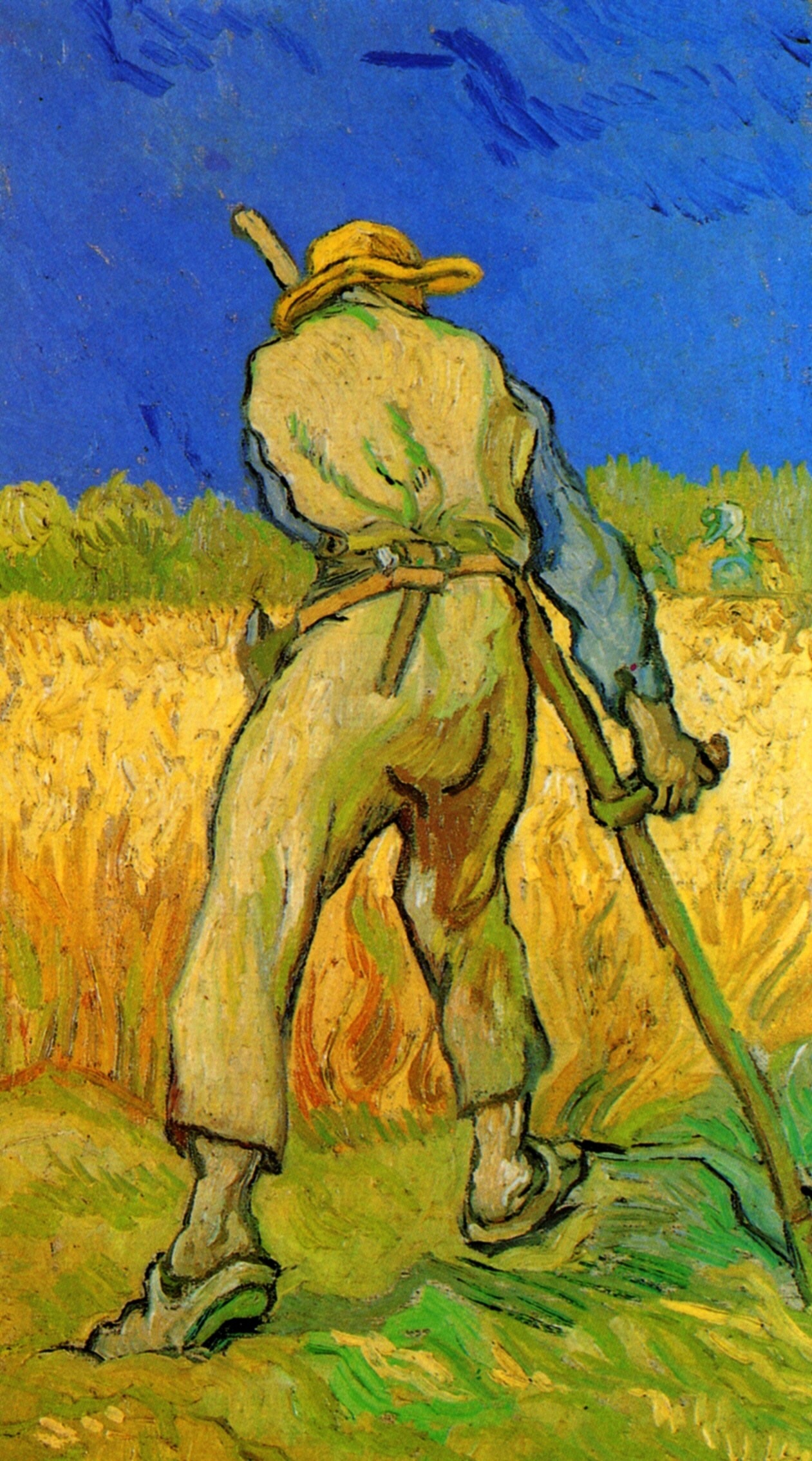
El Segador De Van Gogh Theo van Gogh (marchante de arte) Wikipedia, la
Vincent van Gogh pintó El segador (después de Millet) en 1889 el mismo año en que se marchó de Arles y se ingresó voluntariamente en un psiquiátrico. Se trata de una de las diez pinturas que hizo tomando como referencia la serie de dibujos Los trabajos del campo de Jean-François Millet, siete de las cuales se conservan hoy en el Museo van Gogh de Amsterdam, quedando las otras dos aún.

Wheatfield con un segador 1889 Vincent van Gogh 1853 1890 Holanda Holandesa Post Impresionismo
Vincent van Gogh, Agostina Segatori Sitting in the Café du Tambourin (1887-88; Van Gogh Museum).. Agostina Segatori (Ancona 1841-1910 Paris) was a model who posed for painters in Paris, France, such as Édouard Joseph Dantan, Jean-Baptiste-Camille Corot, Jean-Léon Gérôme, Eugène Delacroix, Vincent van Gogh and Édouard Manet.She is also known for running the Café du Tambourin in Paris.
Grabados De Calidad Del Museo Pilas del trigo con el segador, 1888 de Vincent Van Gogh (1853
Van Gogh was born in Holland, the son of a pastor; he travelled to London in 1873, and first visited Paris in 1874. Over the next decade he was employed in various ways, including as a lay preacher. By 1883 he had started painting, and in 1885-6 he attended the academy in Antwerp where he was impressed by Japanese prints and by the work of Rubens.

Van Gogh, Vincent El segador Postimpresionismo Van gogh art, Artist van gogh, Van gogh paintings
EL SEGADOR I.CLASIFICACIÓN Y DESCRIPCIÓN Autor . Van Gogh. Cronología: 1889 Dimensiones: 43,5 x 25 Técnica: óleo sobre lienzo Localización actual: Memorial Art Gallery of the Unversity of Rochester.. Tipología : Cuadro de género o escenas costumbrista. Estilo : Postimpresionismo. El protagonista del cuadro es el duro trabajo del campesino .
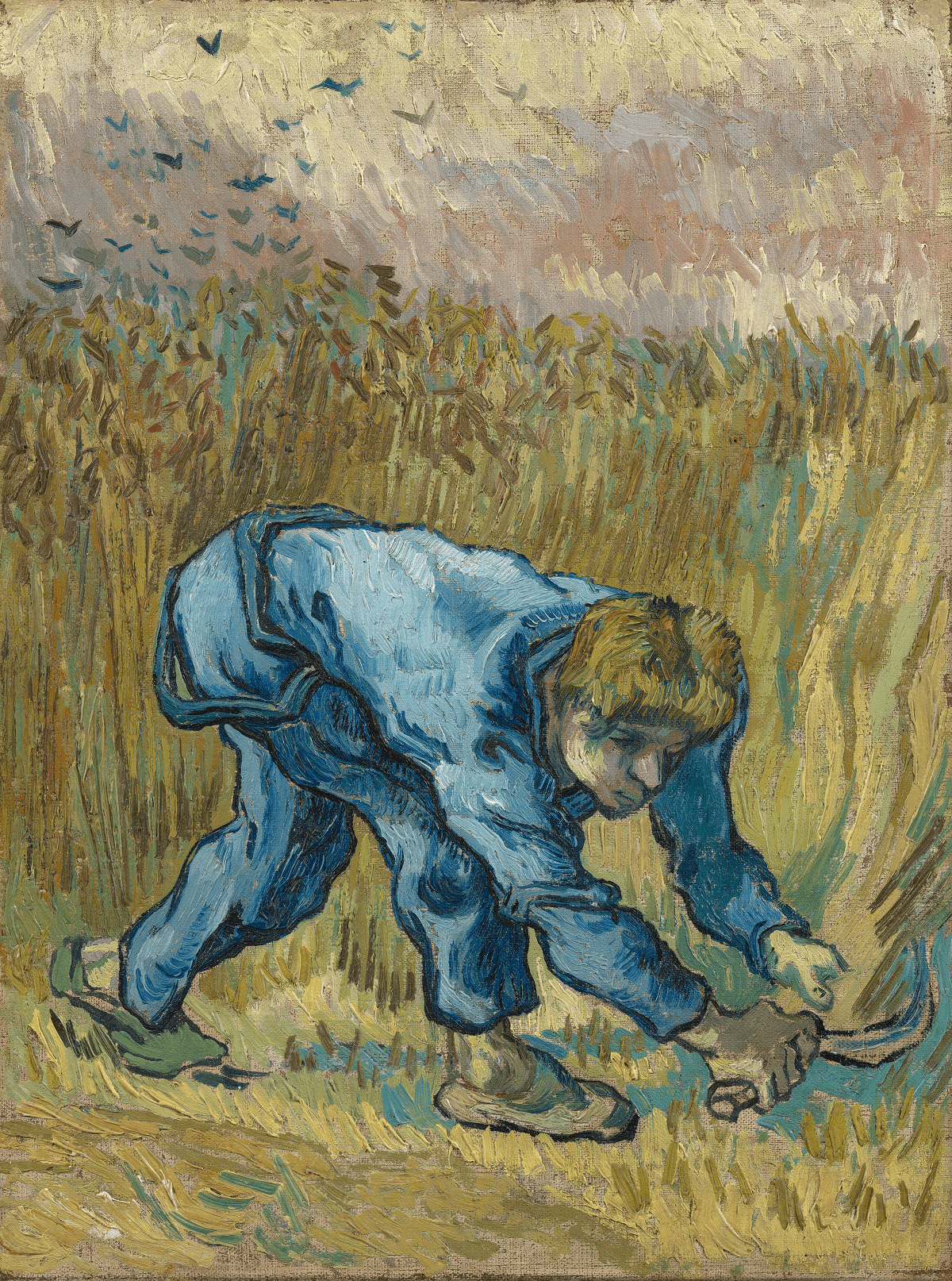
Segador con hoz (después de Millet) Museo Van Gogh
Nowadays, the Potato Eaters is one of Van Gogh's most famous works. Cleveland, Cleveland Museum of Art, Baltimore, Baltimore Museum of Art, Toronto, The Art Gallery of Toronto, Van Gogh saw the _Potato Eaters_ as a showpiece, for which he deliberately chose a difficult composition to prove he was on his way to becoming a good figure painter.
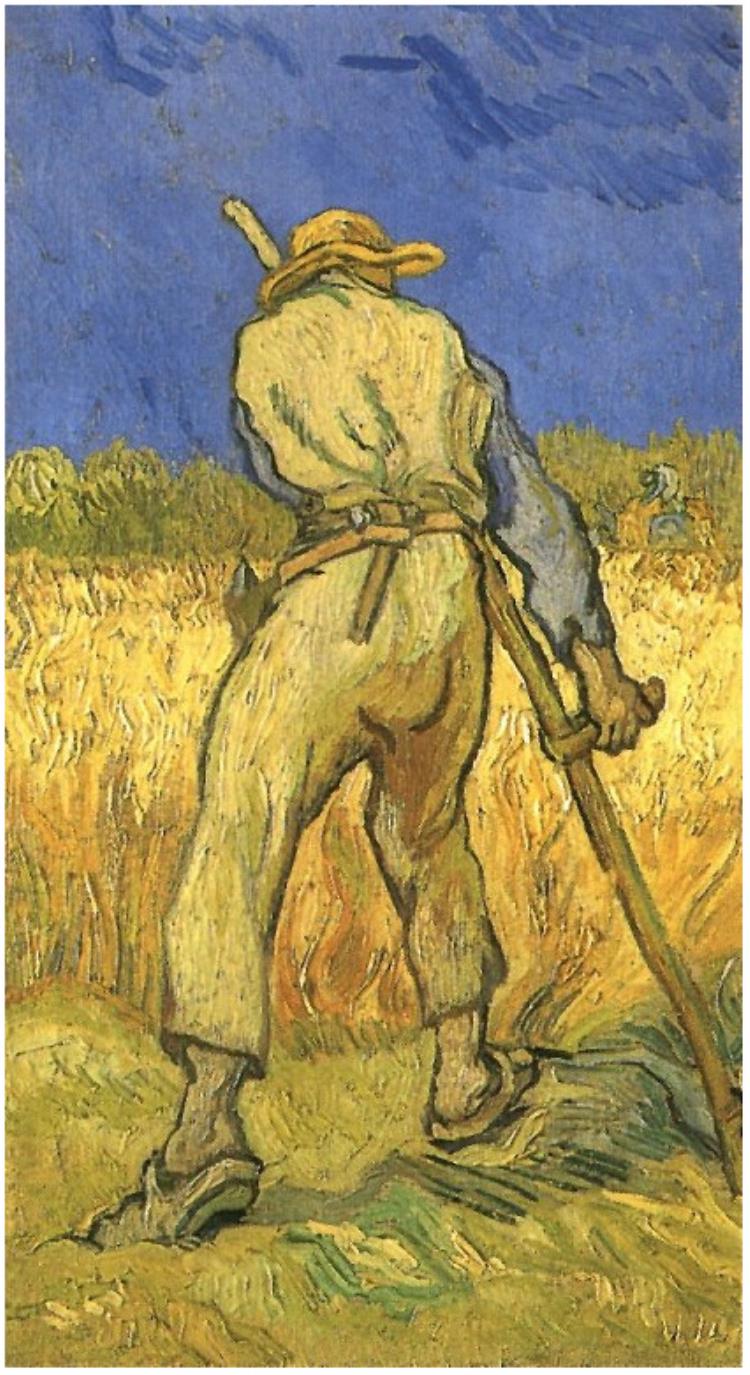
Cuando nació el gran pintor Van Gogh
This painting depicting a reaper in a sun-drenched wheatfield was painted in Saint-Rémy, a small village near Arles.In the wake of several mental crises, Van Gogh had decided to commit himself to the hospital there at the end of April 1889. In September 1889, Van Gogh wrote about the meaning of this painting, referring to the well-known biblical metaphor: "A reaper, the study is all yellow.

Van Gogh, El Segador Comentario PDF
The Reaper ("El segador"), also known as Catalan peasant in revolt ("El campesino catalán en rebeldía") was a large mural created by Joan Miró in Paris in 1937 for the Spanish Republic's pavilion at the 1937 Paris International Exhibition.One of Miró's largest works (5.5 metres (18 ft) high), it was destroyed or lost in 1938, and only a few black and white photographs survive.

Trigal con segador y el sol Museo Van Gogh
Shop exclusive framed prints from iconic artists and collections, only with King & McGaw. Rated 5* by our customers for product quality & service. Find your perfect framed artwork.
El Segador, 1889 de Vincent Van Gogh (18531890, Netherlands) Reproducciones De Arte Del Museo
Vincent van Gogh (1853 - 1890), Paris, January-February 1887 oil on canvas, 27.2 cm x 22.0 cm Credits (obliged to state): Van Gogh Museum, Amsterdam (Vincent van Gogh Foundation) Object data. F-number F0215b. JH-number JH1205. Object number s0093V1962. Dimensions 27.2 cm x 22.0 cm, 36.1 cm x 31.0 cm.

Reaper (después de Millet) . Inglés óleo reproducción de Vincent van Gogh . De septiembre de
5-Star Rated Van Gogh Museum Tickets, Trips and Activities! Book Top Tours on Viator. Van Gogh Museum Tours & Tickets are Selling Out Fast. Book Now to Avoid Disappointment
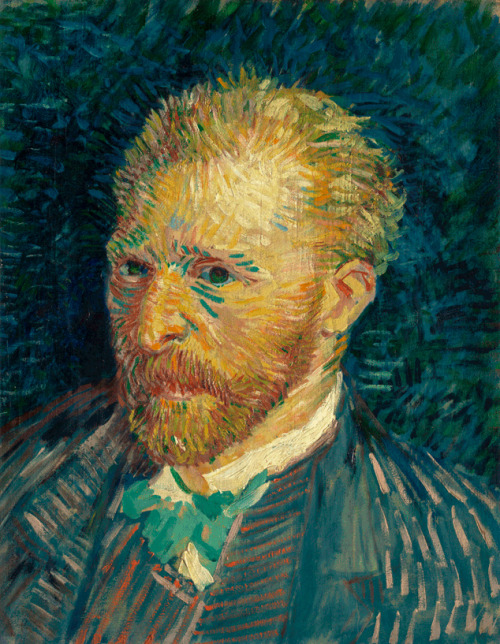
El Segador De Van Gogh Theo van Gogh (marchante de arte) Wikipedia, la
Óleo sobre lienzo44,0 x 33,0 cm.Saint-Rémy, septiembre de 1889F 687, JH 1782 Ámsterdam: Museo Van Gogh. Óleo sobre lienzo44,0 x 33,0 cm.Saint-Rémy, septiembre de 1889F 687, JH 1782 Ámsterdam: Museo Van Gogh. El segador, 1853, Jean-François Millet. Publicada el ; Publicado en Cuadros, Retratos;
El Segador De Van Gogh Theo van Gogh (marchante de arte) Wikipedia, la
We would like to show you a description here but the site won't allow us.
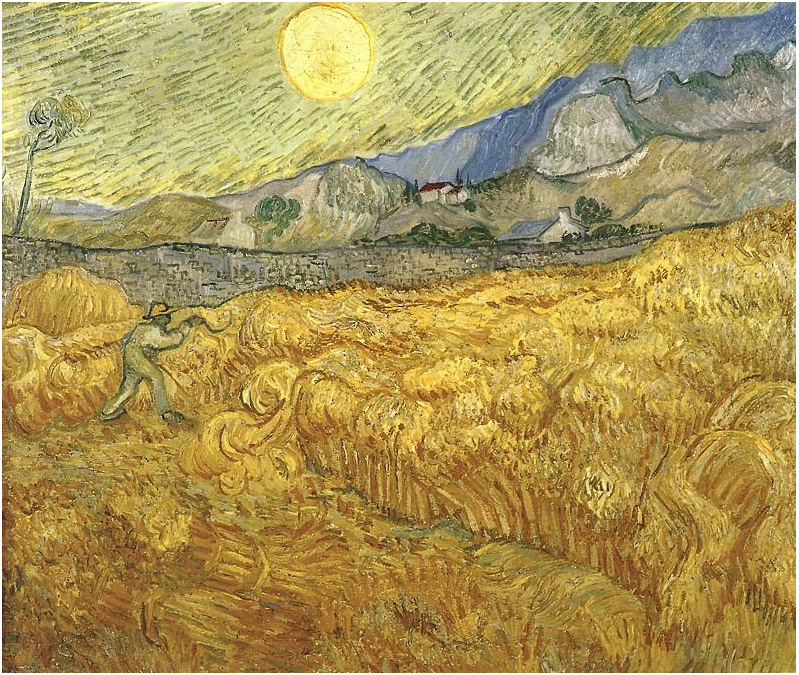
Campo de trigo detrás del Hospital de San Pablo con un segador de Vincent van Gogh 741
El periodo que Vincent Van Gogh pasó en el asilo de Saint-Rémy de Provence, en el sur de Francia, durante 1889-1890, fue sin duda uno de los más tormentosos de su vida, pero también uno de los más fructíferos en términos artísticos.. Campo de Trigo con Segador y Sol, finales de Junio, 1889, Otterlo, Museo Kröller-Müller, F617, JH1753.

La cueva del coco Vincent van Gogh El verano...
Agostina Segatori was the owner of the Café du Tambourin. She had a brief relationship with Van Gogh. There is a glass of beer on the table, and Agostina holds a lit cigarette. The saucers under the glass on the table betray the fact that she is on her second beer. Drinking and smoking in a café was not appropriate for respectable ladies. That way of life was associated with artistic types.

Vincent van Gogh Vincent Van Gogh, Art Van, Van Gogh Art, Van Gogh Pinturas, Van Gogh Paintings
Van Gogh Museum's senior researcher Louis van Tilborgh talks about the lesser known aspects of this painting.. Agostina Segatori Sitting in the Café du Tambourin was painted by Vincent van Gogh in 1887. Agostina Segatori owned the Café du Tambourin that Van Gogh knew intimately. It was a gathering spot for Parisian artists, a place where their work was exhibited.
Reproducciones De Arte Del Museo Los campos de trigo con el segador en la salida del sol de
Van Gogh MuseumAmsterdam, Netherlands. The Naples-born Agostina Segatori owned the café Le Tambourin on the Boulevard de Clichy in Paris. Van Gogh had a brief relationship with her. On the wall to the right is a Japanese print of two geisha girls. It was probably Van Gogh, who painted the café proprietor at the time of a sales exhibition of.